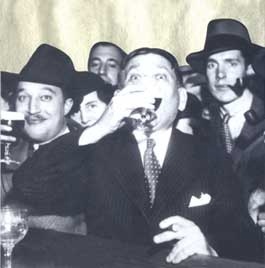As a long-time admirer of H.L. Mencken (since discovering Prejudices: A Selection in a used book store on Queen Street in the mid-1980s), I’ve always had an interest in the skullduggery around the “Scopes Monkey Trial” … and apparently so has Colby Cosh:

H.L Mencken celebrates the repeal of Prohibition, December 1933.
In a merely procedural sense, the Scopes Monkey Trial in Dayton, Tennessee, ended on July 21, 1925 with the conviction of biology teacher John T. Scopes on the charge of instructing students that “man has descended from a lower order of animals.” But of course the real Monkey Trial is eternal, winding its way anew through American life, decade after decade. The carefully staged publicity stunt in Tennessee was merely one occasion in a longer struggle over the nature of man and the limits of his knowledge. I know this is an old-fashioned romantic ACLU-liberal view of the matter, but I hold to it.
As I write this column, county officials in Dayton are unveiling a statute of Clarence Darrow, the garrulous, crooked lawyer who represented Team Enlightenment in the original 1925 contest between Darwinian evolution and the Scriptures. In 2005, the citizens of Dayton, where Monkey Trial tourism is now a crucial industry, erected a statue of William Jennings Bryan on the grounds of the immortal Rhea County courthouse. Bryan had been the chosen hero of evangelical Christianity in the trial, dying less than a week after its conclusion, and is the namesake of a local bible college, which paid for the statue.
[…]
I became a serious student of the Scopes Trial as an undergraduate. Like anybody else, I had seen the 1960 Hollywood rendering of the play about the trial, Inherit The Wind, which represents Bryan as an ignorant windbag, Darrow as a tired, patient figure of ostentatious nobility, and a thinly disguised H.L. Mencken as a cruel nihilist newspaperman. Today, I suppose I would regard Mencken as the real hero of the show. He was privy to the ACLU’s engineering of the trial as a publicity stunt, but he also always said that Tennessee was within its constitutional rights to forbid the teaching of evolution — to be, in his view, just as backward as its people wished.
Inherit The Wind makes its pseudo-Mencken a heartless guttersnipe mostly as a device for elevating a sympathetic Darrow even further. This is part of the movie’s major liberty with the events of the trial: it has Bryan drop dead in mid-rant at the moment of its culmination, instead of waiting a few days. What I discovered as a student was that, aside from this excusable concession to theatrical unity, the film probably deserves some kind of prize for general fidelity to historical events.



